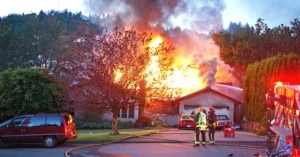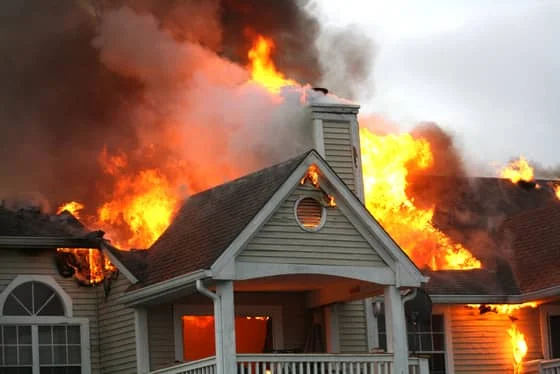What to Do After a House Fire?
In the face of devastation of the Woolsey Fire, Gary Jones not only survived but became a leading source of resilience and hope in the community. Gary, who lost everything in the fire that swept through Los Angeles and Ventura counties, highlights the need to heed evacuation warnings seriously. His recovery journey serves as a step-by-step guide for homeowners grappling with similar losses, particularly focusing on what to do after a house fire insurance-wise. From meticulously documenting damage for insurance claims to navigating the emotional landscape of rebuilding a life from scratch, Gary’s story illustrates the value of being prepared. rebuilding a life from scratch.
The importance of knowing the complexities of homeowners insurance and what to do right after a house fire are valuable lessons gained from the experience. In addition to the above points, Gary stresses the importance of emotional assistance and social support in the recovery process by suggesting that recovery encompasses much more than simply repairing the infrastructure of communities. It also involves the strengthening of people’s mental resilience.
involves the strengthening of people’s mental resilience.
This account revisits not only the actions Gary took to put his life back together, but also acts as a guide to many. It emphasizes the importance of readiness, encouragement, and the will to survive after a fire has destroyed one’s home.
Secure the Property
The primary focus after the occurrence of a house fire is to make sure that the property is secured in order to avoid further damage or entry by any unauthorized persons. This may include boarding up windows and doors, and perhaps more so, installing temporary fencing to the site. This helps to protect the site and also guarantees the safety of other people. In addition, many insurance policies cover losses sustained during an incident and demand that you take measures to reduce any further losses. Hence, understanding what to do after a house fire insurance-wise securing the site is not only a practical approach but an important one to adhere to your policy conditions.
Contact Insurance Immediately
Promptly contact your provider, and inform them regarding the fire incident besides commencing the claims procedure. Use accurate facts regarding the incident, such as when and where it happened and the cause if known. It’s crucial to submit a claims request promptly, as some policies have time limits for reporting damage. Your insurer will assist you with the appropriate forms and evaluations in order for you to be compensated.
Document the Damage
For insurance purposes, it is crucial to document the destruction accurately. Ensure you take clear photos and videos of all the affected areas and make a detailed list of all the damaged items, including their probably worth and the date of purchase. This will help your insurance adjuster in evaluating the claim and assist in faster compensation on your part. It’s crucial to remember that having proper backup can significantly impact the outcome of a claim.
Find Temporary Housing
In the event that your residence becomes unlivable, securing an alternate place to stay is of utmost importance. Consult your insurance policy to see if there are inbuilt provisions like Additional Living Expenses (ALE) that will pay for expenses incurred due to temporary accommodation such as hotel or rental houses. Alternatively, you can search for affordable short-term leasing options in the area or consider staying with relatives or friends until it is safer for you to go back to your house.
Work with Restoration Services
It’s important to ensure that you enlist reputable restoration services if you are to repair your home in a quick and productive way. Look for companies that have positive feedback, the relevant licenses, and can work on a fire damaged site. They should assess the damage caused. Give an estimate and a strategy on how cleaning, repairing and restoring the house will be done. Having such experts is important as it helps to ensure that the process observes the applicable safety measures and rules.
Review Your Policy
Understanding your insurance policy is crucial in the process of claiming the insurance and making the maximum use of it. Analyze your policy thoroughly in order to know the coverage limits, deductibles, and lastly, the exclusions. With such knowledge, it would be possible to control the claim and the healing process in a reasonable manner and also ensure that one makes the most of the policy.
Keep Detailed Records
Take detailed inventory of every dollar spent in relation to the fire and recovery process including but not limited to the receipts for temporary accommodations, food, repairs as well as others related items. Document all the communications that may occur in your case such as with the insurance company, the contractors and any other individual that may be involved in your case. Keeping such records enhances the efficiency of the claims process and provides important proof in case of any disagreements.
Rebuilding and Recovering
During the rebuilding process, the restoration phase, it is crucial to rebuild your house with safety and compliance in mind. Get the necessary permission, coordinate with the contractors, and ensure all repairs comply with building regulations and safety standards. Think about renovations that promote safety and energy efficiency as well as add more value to the property.
Seek Support
Rehabilitation after a fire in one’s house does not only include physical reconstruction, but also psychological repair. Contact local or online fire survivor support groups and seek community resources for help and counseling. A supportive network can be very helpful when dealing with the emotional challenges of rehabilitation after the experience.
Plan for the Future
In the aftermath of a house fire, understanding what to do after a house fire insurance-wise is essential for recovery. Prevent any future fires and be more prepared. Check your contingency plan, install smoke alarms, and think about other ways to reduce fire risks, such as fire-fighting equipment and sprinklers. Also, regularly evaluate and update your insurance coverage to meet current demands and risk exposure.
By following these steps, you can confidently manage the aftermath of a house fire, protect your assets, and begin the road to recovery. Remember, you don’t have to go through this alone—reach out for professional guidance and community support when needed. If you’re ready to take charge of your recovery, start by contacting a reliable fire cash buyer or exploring additional resources today.

